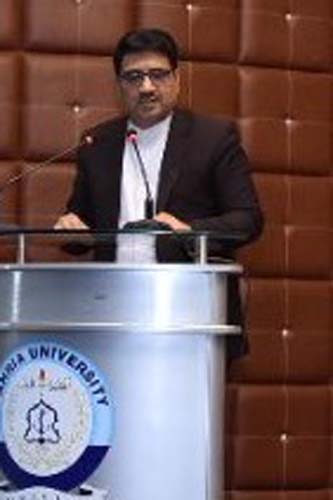
Iran, Pakistan target $5 billion bilateral trade volume: Iranian envoy
Staff Writer
Karachi: Consul General of Iran Hassan Nourian said this week that the trade volume between Iran and Pakistan was not satisfactory at around $1.5 billion per annum, and both governments were targeting $5 billion, which can be achieved easily.
Speaking of the signing of two memorandums of understanding, Nourian said the first MoU was signed for setting up a Joint Business Council between Iran and Pakistan, while the second one was inked in connection with arbitration of commercial disputes.
At the same time, the Karachi Chamber of Commerce and Industry (KCCI) and Isfahan Chamber signed a MoU for improving cooperation between the business communities of the two countries.

Exchanging views at a meeting during his visit to the KCCI, the Iranian CG said that the most important development was the removal of banned commodities from the list of items to be imported from Pakistan under Iran-Pakistan PTA.
Trade Development Authority Pakistan Chief Executive Zubair Motiwala, KCCI President Mohammed Tariq Yousuf, Senior Vice President Touseef Ahmed, Vice President Muhammad Haris Agar, Chairman Diplomatic Missions and Embassies Liaison Subcommittee Zia ul Arfeen, Former Presidents Majyd Aziz and Iftikhar Vohra along with others attended the meeting.
Nourian said that the shared 1,000kms border put the countries in the perfect position to meet each other’s demand for necessities, including supply of Iranian natural gas, crude oil and petrochemical products, and Pakistani agricultural products.
Identifying the lack of a banking channel as the main obstacle in smooth trade, the CG said that to deal with this issue, Iran has suggested the Pakistani government and the State Bank to allow trade via national currencies of both countries or opening of an Iranian bank in Karachi in addition to devising a barter trade mechanism.
A barter trade agreement was signed between the Ministry of Commerce in Iran and Pakistan, and Quetta and Zahedan Chambers were allowed to begin barter trade. However, due to some technical issues, barter trade had yet not commenced.
He also said that on Motiwala’s invitation, the Chairman of Trade Promotion Organization (TPO) Iran would visit Karachi on January 16 to sign a MoU with TDAP focusing on removing trade barriers and exploring ways to enhance trade relations.
TPO chairman would also participate in Iran’s Single Country Exhibition at Karachi Expo Center beginning on January 16.
Motiwala, while warmly welcoming Iran’s initiative to hold an exhibition in Karachi, he assured of TDAP’s full support and cooperation along with the KCCI’s assistance in organising this important event. “KCCI, which has been regularly holding My Karachi Exhibition since many years and has the required expertise for staging such events, is ready to fully assist Iran so that its Single Country Exhibition could be organised in an impressive manner.”
Confectionary items, petroleum products and its raw materials, plastics and many other products in which Iran holds expertise can be imported to Pakistan, whereas tea, rice, fabrics, garments and several other products can be exported to Iran, he added.
KCCI President Tariq Yousuf said it was heartening that KCCI and Isfahan Chamber recently signed a landmark MoU to establish a practical framework for the development of business relations.
The MoU would set forth the procedures of cooperation, which could enhance implementation of mutual economic objectives between the two chambers.
Referring to negotiations on free trade agreement (FTA), he said that if this materialises, it would revive Pak-Iran bilateral trade to the next level and develop deep financial and economic cooperation.
He also stressed the need to expand the barter trade basket by adding more products to capitalise and facilitate importers and exporters of both countries, which would certainly deepen Pak-Iran economic integration.
Yousuf noted that Pakistan-Iran Joint Trade Committee agreed to ensure phase-wise implementation of border markets and investors’ access to the special economic zones. This would enhance trade between the two countries, strengthen cross-border economic cooperation and discourage illegal border trade by improving formal trade between the two countries.
